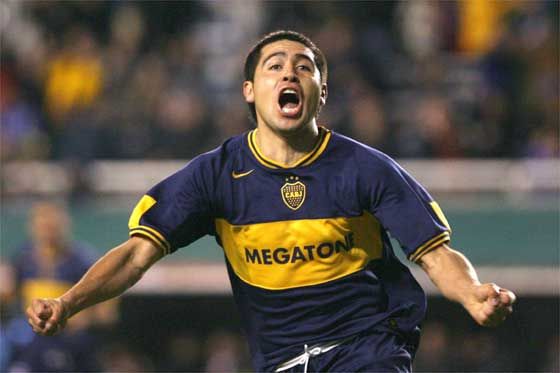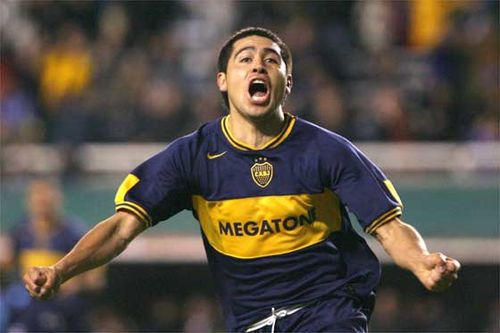
Juan Roman Riquelme: Argentina's most under-appreciated talent

If there was one thing missing in Argentina’s magical run to the final of the FIFA World Cup, it was a playmaker in the mould of Juan Roman Riquelme. The midfield maestro, who recently quit Boca Juniors to join Argentinos in the Argentine second division was one of the most gifted players of his generation and was known for his vision, passing and goal scoring ability. Andres Iniesta described him as ‘one of the best talents in football’. He has also been described as an unfulfilled potential and a player who could have achieved more with the supreme skills he possessed. Yet, his artistry and poetic interpretation of the beautiful game remain unparalleled.
As he now approaches the twilight of his career, let us take a look back at the career of a supremely talented player who perhaps deserves more credit than he gets.
Success with Boca Juniors
Riquelme has spent the majority of his career at Boca Juniors where he has enjoyed enormous success. He is regarded as one of the best players in the history of the club and was part of the golden era of the club at the start of this century. He had three spells at the club after emerging from the youth ranks of rivals Argentinos.
In his three stints at the club, he helped the club secure ten titles, which included five National Championships, three Copa Libertadores, the Copa Sudamericana and the 2000 Intercontinental Cup when Boca defeated Real Madrid, where he played a huge role. Despite his lack of success in Europe, he was largely successful at his beloved Boca where the fans endearingly called him as ‘Roman’.
Mixed spell in Spain

One of the reasons why Riquelme is considered an unfulfilled talent is due to his failure to win any Championships in Europe. After achieving enormous success with Boca, Riquelme joined Barcelona in 2002 for a reported €11 million. Unfortunately, he arrived at a time when the Presidential elections were in full swing. The then manager Louis Van Gaal described him as a political signing and did not give him many chances. He was mainly used as a substitute and in the Copa Del Rey. After one unsuccessful season with the Catalan giants in which he was played out of position on the wings, he moved to Villareal on a loan deal.
His spell at Villareal was a more fruitful one. Played in his natural position as an attacking midfielder, the Argentine helped the Valencian outfit enjoy one of their best spells in La Liga and Europe. He capped off the 2004-05 season with a career-best 15 goals in 35 games and in the process, helped the club to their best-ever third position in the La Liga. Following his exploits, Marca awarded him the title of ‘Most Artistic player’ and he was also nominated for the 2005 FIFA World Player of the Year award.
The following season saw the Argentine lead the club to the last-four in the Champions League . In the second leg against Arsenal, Riquelme missed a crucial penalty wich would have taken the game to extra-time. Riquelme made just 13 league appearances in the first half of the 2006-07 season and following his problems with the manager Manuel Pellegrini and the board of directors, Riquelme accepted a loan deal back to Boca Juniors which was made permanent the following year. Thus ended his European adventure which was by all means a successful one but one which lacked the crowning glory of a championship.
Performances for Argentina

Riquelme’s time for the Albiceleste has been a mixture of brilliance and controversy. He made his debut as early as 1997 in a qualification match for the 1998 World Cup. However, it was not until the 2006 World Cup that Riquelme started playing a prominent role in the side. Riquelme represented Argentina at the 2005 Confederations Cup, the 2006 FIFA World Cup, the 2007 Copa America and at the 2008 Beijing Olympics and is perhaps best known for his performances with the Argentine national squad in the 2006 FIFA World Cup in Germany.
He was the focal point in the team’s run to the quarter-finals where they lost to Germany. Cruelly, Argentina conceded a goal minutes after he was substituted and went on to lose on penalties against the Germans. His role in the famous 25 pass goal against Serbia and Montenegro was proof of his undeniable talent and footballing acumen. He also played a major part in the 2007 Copa America in which Argentina finished runners-up after suffering a 3-0 defeat to Brazil in the finals. His involvement was very crucial to Argentina winning the gold medal at the 2008 Olympics.
Riquelme’s international career was also marred with controversies due to his problems with managers. It is indeed unfortunate that a player of his undeniable quality would go on to make only 51 appearances for the Albiceleste. Following his disagreements with Diego Maradona before the 2010 World Cup, he announced his retirement from International football.
Riquelme is an artist on the field of play, relying more on his technique than physical prowess. A player gifted with perhaps the most natural appreciation of space, he dominated games with his style and ability to make his team play as a collective unit. In an age where players aspired for individual brilliance, he was a team player who helped bring out the best out of those around him. Despite the predominance of the European style of football which lays emphasis on fitness, speed and strength, Riquelme stood true to his philosophy and understanding of the game. He might not be on the list of the greatest players to have playeed the game but he is undeniably, one of the players who played it best.